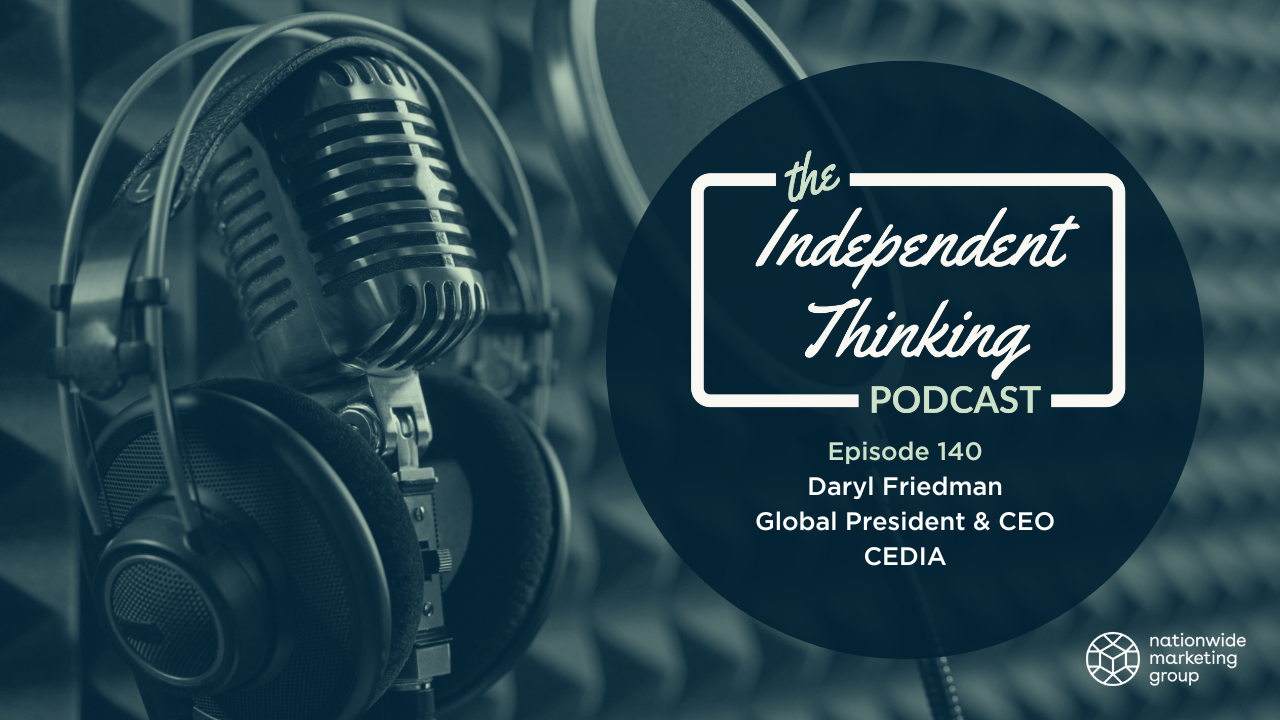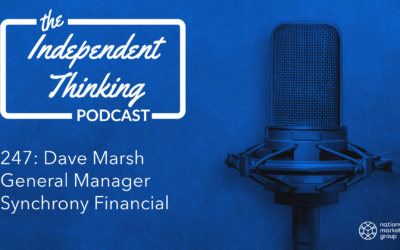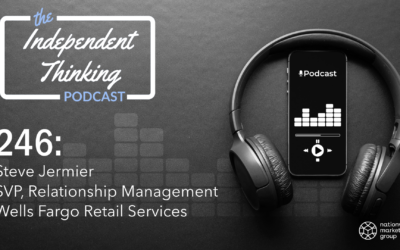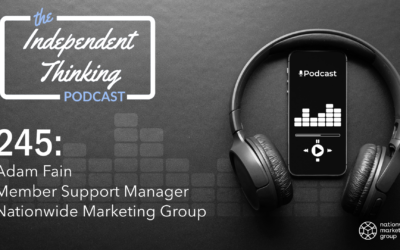Barely nine months on the job, CEDIA Global President & CEO Daryl Friedman has been a busy man, getting full ingrained with the world of custom integration. We sat down with Friedman during the recent CEDIA Expo in Dallas to talk about the challenges the industry faces, the importance of education and more.
Rob Stott: All right, we are back on the Independent Thinking Podcast and excited right now to be sitting down with the global president and CEO of CEDIA, Mr. Daryl Friedman. Appreciate you taking the time, and you’ve been doing this for nine months in this role, and it feels like I’m sure, has it flown by or has it been a long paced out nine months here?
Daryl Friedman: I will tell you, it’s actually flown by. The last nine months have been a blur and it’s all been kind of focused on this moment, CEDIA Expo coming, so I’ve really been looking forward to this day and it’s finally arrived, so now I can enjoy it.
Rob Stott: Awesome. Well, we’re glad to steal just a few minutes of your time here for a podcast while we’re in Dallas for CEDIA Expo. But before we dive into the show and everything that we got going on, give us, for those that don’t know, watching the podcast, a little background on yourself and your path to the head role here at CEDIA.
Daryl Friedman: Sure. I’ve been in the nonprofit sector my whole career, so I’ve always been working in service organizations. My last job was with the Grammy Awards organization, the Recording Academy. And most people know the Academy for that once a year award show, but essentially we were the association for recording artists, songwriters and recording engineers. And I oversaw the producers and engineers wing, so we got very involved with CEDIA because we endorsed CEDIA’s immersive audio technical training, so I knew CEDIA. And then when they approached me to come do this job, I realized it was such an interesting opportunity to expand beyond music and really help people who I’ve always wanted to be in jobs where we help people make lives better and CEDIA does that by making their home lives better.
Rob Stott: Well, a cool thing, the nonprofit side, the non-profit background myself, having spent some time at the American Society of Association Executives sounds so formal, but an organization that is known for dealing with association professionals, the association for association people. There’s one for everything. But a cool perspective, I think to bring that to CEDIA, having the non-profit background as opposed to say, there’s always the ongoing conversation of being someone that knows associations or someone that, in this case would be an integrator being involved with CEDIA. What does having that nonprofit background, do you think, bring to you being that in this role?
Daryl Friedman: Yeah, I think for every search committee of every association, they have two piles of resumes. One is people who come from the industry and people who come from association world. I come from the association world, so I think I’m bringing something that maybe CEDIA needed, which was a little bit more of a professional management and understanding of how to work with boards. And I am the first CEO of CEDIA who didn’t come from the industry or from CEDIA itself. But I think what maybe my resume was kind of in the middle of those two piles because I had that experience with audio, I had that experience with CEDIA and so I did appreciate and value what CEDIA does, so I think they realized the combination of my associational background with my knowledge of CEDIA maybe was a good fit and hopefully I proved them right.
Rob Stott: Well, off to a good start for sure. We said it at the top, only nine months, crazy that it’s only been that long and need to see that you have that experience because of the recording background and being in the music space. But what have you learned in those nine months? You’ve been going around the world talking to a lot of integrators from all over the world and members, vendors alike. Anything surprise you about this space so far?
Daryl Friedman: Yeah, it did actually. I spent the first 100 days just on a listening tour talking to, I spoke to literally hundreds of integrators and manufacturers and listened to them and what they had to say about CEDIA. I will be honest, it wasn’t all positive, but it was also very constructive. And the one thing is everyone’s rooting for us. Everyone wants CEDIA to be successful, but there was a gap between what CEDIA has been doing and what people knew about CEDIA doing.
And so once the show was sold and CEDIA doesn’t own CEDIA Expo anymore, remember the community was feeling like, “Well, what is CEDIA’s role now?” Well, CEDIA’s role is amazing. They are doing incredible advocacy work, educational work, connecting people, certification, but maybe not telling the story as effectively as we should have. My first role was to really do a better job of saying, “Hey, CEDIA is doing all these wonderful things. You need to know about this and you need to become involved. Really spent the first six months with the staff and the board working on a new strategic plan, kind of redefining our value, establishing our pillars, which are advocacy, connection, and education. And now coming up after CEDIA Expo, we are set to go off in that for your plan.
Rob Stott: Yeah. Well, your background too, on the non-profit side, advocacy, is that something that you had dabbled in or was a big part of your roles at non-profits previously? Is that right?
Daryl Friedman: Yeah, it was more than dabble. Yeah, I worked on some pretty significant-
Rob Stott: I say dabble.
Daryl Friedman: Yeah, no, we worked on some pretty significant legislation. I knew some of the key members of Congress, Most of what the work I was doing was on the federal level, so we had passed the Music Modernization Act. We helped pass some COVID relief to get that to independent contractors. But what’s happening here at CEDIA is so much on the state side and the regulatory side that really, it’s new for me. And we have a great expert here in Darren Reaman. We had a great advocacy town hall this morning, 300 people came to learn more about the advocacy work. I think this is the beginning of re-educating our community about the value of CEDIA.
Rob Stott: Yeah, no, and also aside from learning things, I’m sure you can see some of the opportunities that exist out there. When you think about what you heard from members and from the community, what are some of those opportunities that exist for whether it’s the organization or the integrators that are members of CEDIA, where can they look to the next year or so as areas that they could improve their businesses?
Daryl Friedman: I think where CEDIA is primarily poised to help is one on workforce development, making sure every association I’ve ever known or been involved with, the membership comes to you and says, “Help us get more business.” What I found with CEDIA was every member told me, “I have more business than I can handle. I need people, I need technicians, I need trained people, integrators to go into homes.” Workforce development is going to be a key priority for us. We’re going to be announcing actually at this show, a new initiative to bring more people into the industry to work in this industry, which is a great industry to work in.
So that’s I think, that’s going to be job one. The advocacy pieces I mentioned, we have to protect the industry. Behind the scenes, we’ve allowed businesses to stay in business and people don’t even know it. There have been regulatory efforts in states that would actually push our integrators out of the space, so doing that kind of work. On the education front, we have now the only globally recognized sort of smart home certifications, our CIT and IST. All of those things are really going to be part of our big strategic plan going forward.
Rob Stott: And you mentioned it, the challenge of finding talent, that’s something that we hear a lot about here, whether it’s at this show or talking to our members of Nationwide and HTSN. Is that a global issue? Going around, talking to these members and integrators in Europe, are they also facing the same challenges of talent shortage and things like that?
Daryl Friedman: 100%. I’m hearing the same message, whether it’s London or Los Angeles or in the middle of the country. Everybody’s having trouble finding talent. And this is a macroeconomic issue is every industry. But I think just we have such a great story to tell about you can join an industry where you know you’re going to get work. You know you’re going to go into people’s homes and make their lives better, and you’re going to be well compensated for it. It’s just a matter of telling that story in the most compelling way we can.
Rob Stott: And I know another part of that too, obviously, is education. And we’re sitting here, I think things might still be a little wet, but the partnership between Nationwide and HTSN and CEDIA, education, you mentioned one of the big pillars as well, and I know Hank Alexander, our director of HTSN, has made it a big pillar of his as well, making sure that the members are educated, they have access to education, and had a pretty cool announcement right before the show about the learning academies that are launching, powered by CEDIA for our HTSN members and our AZY unlimited members. Talk about that a little bit, about being able to bring that kind of partnership together.
Daryl Friedman: We’re so excited by this. This is really a great news for us to tell with this partnership with nationwide HTSN, we’re basically going to be sharing our knowledge and this vast online library of courses and education that are now going to be available to all those members. It gives us a chance to really expand our reach of this wonderful education and also gives HTSN a chance to have their members be upskilled and get the access to this knowledge, so we’re really proud of it. We’re really happy to be partnering with them.
Rob Stott: And I know it’s really on the HTSN side, an expansion of, I forget how long ago it was at this point, but I see the man not too far behind the camera, Giles, had him on the podcast talking about the initial HTSN and CEDIA partnership. I want to say it was maybe March or April of ’21, really seeing the two organizations come together and all HTSN members being basically made members of CEDIA by simply being a member of HTSN. Seeing the partnership grow and just the investment in education, it covers all areas of the industry. Talk about, for those that may not be familiar with what the CEDIA education platform entails, it’s end to end, right?
Daryl Friedman: Yeah, it’s a wealth of information from the very beginning of introduction to the industry to the most advanced aspects of it, including certifications where we, again, have the only globally recognized certifications that allow the end user, the consumer, the homeowner, the architect, the designer to know this person is talented and skilled. It really is just something that’s been built up and we want to share it. We want this industry to be educated. We feel that, that’s good for everybody, so having this partnership just expands that access.
Rob Stott: And on the HTSN side, seeing members that already go into an exchange platform, and it’s right there. You log in and the button’s right there, CEDIA Academy, the link to it is right at the top, easy to access. You’re already signed in. Just go basically take advantage of that education now. Already CEDIA members? Go take advantage of the full slate of CEDIA education. It’s awesome to see and I know the commitment to education, you can’t talk about it enough, especially at a show like this, I feel like we hear so much about it. But just the importance of whether it’s on the talent development side, bringing in new talent or on your teams where it’s just continuing that education, making sure that your integrators are up to date on the latest technologies and trends and things like that. It’s cool to see that kind of commitment between two organizations that just get it.
Daryl Friedman: And the beauty of it is all on demand, so everyone’s so busy. Everybody, they can’t take time out of a workday, they’ve got jobs to go to if they want to do it in the evening or on the weekends, the mornings, whatever. It’s just a really great system, we’re proud of it and we’re proud to have this partnership.
Rob Stott: Yeah, it’s awesome. Well, one thing, we kind of buried the lead here, we are sitting at CEDIA Expo. This is your first official CEDIA expo in the role. You mentioned it at the top, it’s been building towards this. What’s it like to actually be here and the vibe? You can see it behind us if you’re… Well, maybe not behind us necessarily, you hear it around us, all of the buzz and excitement of being here in Dallas. What’s it been like for you these couple days?
Daryl Friedman: It’s just amazing to see the energy, the enthusiasm. First of all, for many people, it’s been three years since they’ve even been back together. But this show is full. The show is almost what it was in the pre COVID days and great new products out here. Great buzz, great energy. And for CEDIA, it’s a chance for us to tell our story again and reintroduce ourselves, so to a whole new audience, so it’s really been worth waiting for.
Rob Stott: Well, not to say pick out a vendor or anything, but anything that you were very most excited to see while you were here?
Daryl Friedman: Well, I don’t want to mention brands because they’re all members, but I mean certainly the lighting and shading area is something that’s going to be a huge growth area. Most integrators are going to find the penetration already is very small, potential for growth is great and wellness. I think that’s the next great thing for people to be able to stay in their homes and have this new technology that can help them and live a healthy life.
Rob Stott: Awesome. Well Daryl, we appreciate the time. This was a lot of fun chatting with you and taking a few moments of your time and doing this from the show floor. It’s cool. I can’t help but just look around and see the action as it’s going on, but this is a lot of fun and we look forward to catching up again soon and seeing how this partnership continues to grow as well, so thank you.
Daryl Friedman: Great. Thanks for having me on. It’s been great talking with you.
Rob Stott: You bet.




